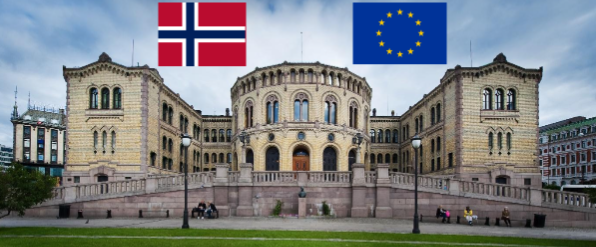The EU’s Partner In The North How two NOs to accession resulted in a close relationship between Brussels and Oslo
Kristoffer Saetre Reading time: 3:30 min
Norway has recently been shaken by a governmental crisis. Legislation regulating the energy market has caused a break between the social democratic party (AP) and the center party (Senterpartiet). Interestingly, the legislation in question is EU legislation as part of the energy market package revision from 2024. But wait, why does Norway, a non-EU state, implement EU legislation? What is going on here? This crisis allows us to reflect on Norway’s relationship with the EU and can help us explain why EU energy prices have resulted in a minority government, even though the Norwegian people voted twice against EU accession.
First, let us consider why Norway is not part of the EU in the first place. In total, Norway tried four times, vetoed twice by French President Charles De Gaulle and rejected twice by the Norwegian population, to accede to the European Union. This Eurosceptic position is exceptional, considering its neighbours Denmark and Sweden are longstanding EU members. The reasons behind these votes can be separated into two categories. For conciseness, this post will consider both elections together.
A relatively young independence
Until 1905, Norway was part of a union with Sweden. Although it was formally an independent state with its own constitution, after it gained independence from Denmark, the Swedish Monarchy still dominated the young nation. Only after the end of this northern union did former Danish Prince Haakon VII accept the throne as the new king of Norway. This long dependence and suppression of Norwegian culture and language resulted in a counter-culture. Because of this mindset, the Norwegian people found it difficult to give up their newfound sovereignty to the European Union after both votes in 1972 and 1984.
Fishing as an obstacle
The second reason is found within Norway’s economy. While the South increasingly industrialised, the North of Norway relied on fishing as its primary income. Here, fishermen feared that the EU’s fishing fleets with bigger capacities would take over their waters. Proposals to exclude foreign fishing boats from 6 miles of the coast were ignored and resistance grew. Additionally, Norway’s agriculture was heavily subsidised due to unfavourable conditions in the northern climate. By voting NO to the EU accession, farmers wanted to preserve the subsidies and their way of life. Lastly, Norway is geographically separated from mainland Europe, bordering only Sweden, in the North, Finland, and Russia. This geographical separation from the western drivers of integration contributed to the view that EU accession for Norway was not necessary.
According to this reasoning, although not every Norwegian citizen can claim to be satisfied with it, Norway remains a non-EU country. Yet, Norway still maintains a close relationship with the EU as illustrated below.
Current relationship
In 1994, instead of directly joining the EU, Norway opted for the European Economic Area (EEA) Agreement. This agreement, comprising all Member States of the Union as well as Norway, Liechtenstein, and Iceland, establishes a Single Market for all signatories giving way to free trade. It combines all freedoms of the EU such as the free movement of goods, services, persons, and capital, as well as competition and state aid rules. In turn, all signatories, including Norway, must comply with EU internal market regulations. Moreover, Norway contributes financially towards social and economic cohesion in Europe. Although Norway benefits from free trade in the internal market, it has limited decision-making power, being excluded from the legislative processes in Brussels. Most notably, the agreement does not cover common agriculture and fisheries policy, taking the votes of 1972 and 1994 into account.
The EU and Norway also try to walk hand in hand when it comes to defence matters. The two partners closely align their defence policies and exchange opinions on vital issues. To that end, Norway maintains a Mission to the EU directly established in Brussels. Lastly, Norway is likewise part of the Schengen agreement, which provides its citizens with a right to passport-free travel in the EU and vice versa.
In sum, the EU has found one of its closest partners in the North. Despite Norway demonstrating that it did not want to become part of the Union, additional agreements and treaties have resulted in a beneficial relationship for both sides. Coming back to the government crisis, Norway is bound to implement EU legislation on the energy market as part of the EEA Agreement. However, past resistance in the two votes still impacts public opinion to this day. That is why the center party, representing Eurosceptic opinion, chose to leave the current government. We will see how the AP will manage their minority government, and more importantly, how the upcoming election on the 8 September 2025 will turn out. Does Norway want to cling to this Eurosceptic stance and resist further implementation of EU legislation? Or is it time for change? The elections will give us the answer.

